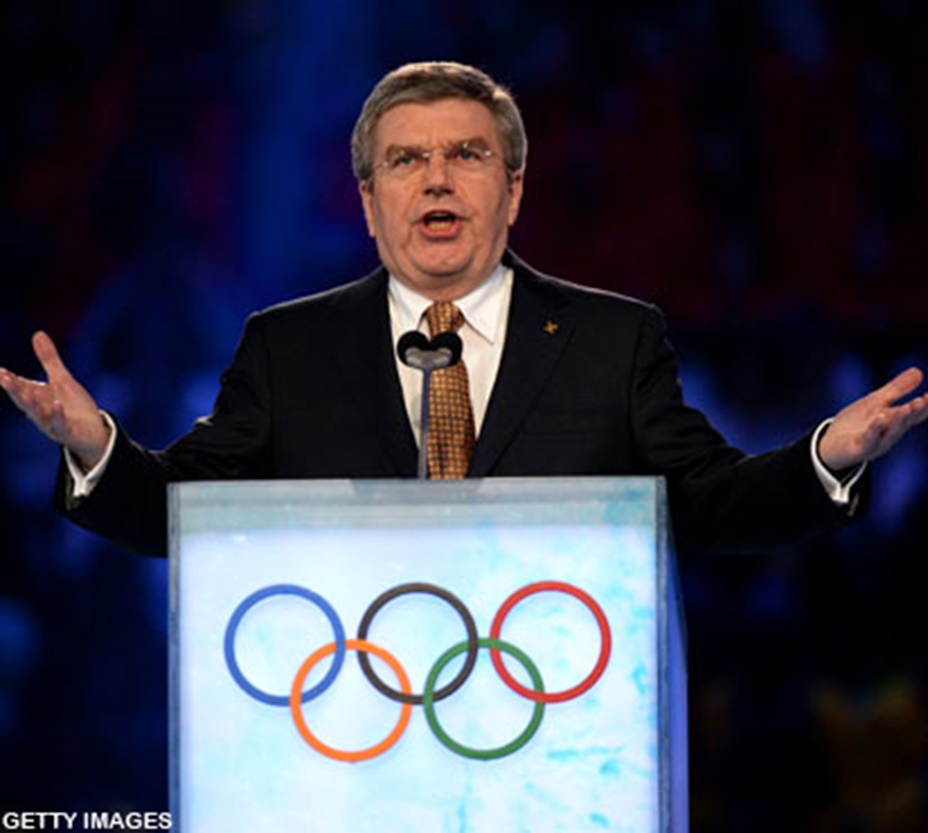IOC President Thomas Bach on Sunday said that the Sochi Winter Games "set records in competitor numbers, medals awarded and quality of venues, keeping athletes happy and proving critics wrong," according to Karolos Grohmann of REUTERS. Bach said that "Russian government support and President Vladimir Putin's personal involvement had contributed to the success." Bach: "We saw excellent Games and what counts most is the opinions of the athletes and they were enormously satisfied." He also said that "critics who had doubted Russia could pull off hosting such an event would now be convinced." Bach: "You have to ask all those who criticized whether they change their opinions now" (REUTERS, 2/23).
RUSSIA MAKES FUN OF SELF: REUTERS' Mike Collet-White wrote an emotional Closing Ceremony "painted the hosts in soft colours, in contrast to the muscular, assertive spectacle that kicked off the Games, and there was even room for a joke at the home nation's expense." The show at the Fisht Stadium "opened with a volley of fireworks and a boat suspended high in the air above waves formed by lines of hundreds of dancers in shimmering costumes." They began to form the five rings of the Olympic symbol, "but, in a reference to an embarrassing technical hitch during the opening ceremony when one failed to open, only four circles appeared." After laughs and loud applause from the audience, "the fifth ring eventually opened, and the mood was immediately more playful than an opening spectacle which had sought to portray Russia as a strong nation with nothing to fear." Closing Ceremony Artistic Exec Producer Marco Balich said, "They are two very complementary shows." It "will come as no surprise that Sochi's was the biggest Winter Olympics closing ceremony ever staged." Bach "gave Russia a resounding vote of confidence in his closing address." Bach: "Tonight we can say: Russia delivered all what it had promised." After Bach formally declared the Sochi Games closed, three giant mascots of the Games -- a bear, a snow leopard and a hare -- "appeared and the bear blew out the Olympic flame." A thousand children from the Pan-Russian Choir "performed in a rousing finale symbolising the arrival spring, before choreographed fireworks exploded from the roof of the stadium" (REUTERS, 2/23).
STANDOUT MOMENT: The AP reported Bach said that "Ukraine's victory in the women's biathlon relay was the standout moment of the Sochi Olympics, a powerful symbol of unity during the country's bloody political crisis" (AP, 2/22). In London, Owen Gibson wrote the buildup to the Sochi Olympics, described by critics as a $51B monument to one man's ego, "had been dominated by security concerns, human rights protests, doping fears and weather worries." Operationally, "you could not fault them (media hotels aside)." The buses "ran on time." The venues, "shimmering like alien spacecraft that had crash-landed in a concrete car park, looked stunning -- especially at night." Inside, fears that the atmosphere would be flat and stands empty in this remote sub-tropical corner of Russia by the Black Sea, "proved unfounded." This "was the ultimate flatpack Olympics, the first time a country had built not only an Olympic Park but a city to host it in." As a result, "for all the friendliness of the volunteers, it lacked soul" (GUARDIAN, 2/22). Also in London, Cole Moreton wrote Russia "was meant to win gold in the ice hockey, by far the most important sport in the Winter Olympics as far as the host president is concerned." But Russia "is not going to win the gold in Sochi in 2014." There "will be no crowning glory" for Putin. The team "crashed out 3-1 to Finland." The defeat was described by the daily newspaper Sovietsky Sport -- once the house sporting journal of the USSR --- as "shameful for a world power." So "without that golden moment, the question has to be asked: was it all worth it?" (TELEGRAPH, 2/22).
EYES ON THE FUTURE: REUTERS' Ljunggren & Petrova wrote Russian state lender Sberbank Deputy Chair of the Board Stanislav Kuznetsov said that the Gorky Gorod resort in the snowy Caucasus peaks above Sochi "was packed during the Winter Olympics." Now the Games are ending, "Kuznetsov's job is to keep filling the nine hotels," holiday apartment, luxury stores and the large supermarket complex, "which includes a massive artificial beach and lake on the top floor." Kuznetsov: "We are seriously thinking about the future." His challenge "epitomizes the broader struggle that Russia faces" to get a lasting return on an estimated $50B spent on developing the region for the Sochi Games. Officials said that "foreign tourists are unlikely to flock to the region any time soon, if only because there are virtually no direct flights to Sochi from abroad and some potential travelers are put off by visa requirements." Visitors polled in the streets of the resort "had mixed opinions about whether they would come back" (REUTERS, 2/23).
CREDIT SCORE: In London, Joe Morris wrote the Sochi Winter Olympics, "probably the most expensive in history, are not denting Russia’s sovereign credit profile, but it has cast a cloud over other issuers." Moody’s Investors Service views the Olympic spending "as credit neutral for the country’s sovereign creditworthiness." It notes Russia’s debt to gross domestic product ratio "is among the lowest globally," at roughly 12%. Fitch Ratings similarly calls the impact on Russia’s sovereign finances "minimal," as the $50B spending estimate equates to less than 2.5% of Fitch’s estimate of Russia’s '13 GDP (FINANCIAL TIMES, 2/23).




